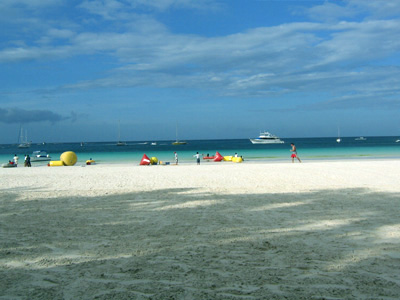RP ranked as 87th in tourism

The World Economic Forum (WEF) has ranked the Philippines as 87th among 124 countries in the first ever Travel and Tourism Competitiveness Index. Out of the possible perfect score of 7.0, it received 3.8.
Ms. Jennifer Blanke, senior economist of the World Economic Forum's Global Competitiveness Network, quickly clarified that the ranking was not about the beauty or attractiveness of the countries, but about the quality of their business and regulatory frameworks and transport and tourism infrastructure.
"Our study is not a beauty contest, or a statement about the attractiveness of a country. On the contrary, we aim to measure the factors that make it attractive to develop the travel and tourism industry of individual countries," Ms. Blanke said.
The Philippines was ranked behind other Southeast Asian countries such as Singapore (8th), Malaysia (31st), Thailand (43rd) and Indonesia (60th). It was ranked ahead of Vietnam (87th) and Cambodia (96th).
The Switzerland-based organisation ranked its home country as number one in the index, with a score of 5.66. "Switzerland is an extremely safe country, with excellent health and hygiene indicators, as well as environmental regulation that is among the most stringent and effective in the world. And in a country that has some of the most well regarded hotel management schools in the world, the quality of the country's human resources is second to none, ensuring an adequate supply of high quality staff for the industry," it said.
France and Spain, the world's top destinations in terms of visitor arrivals, were not in the top ten list. Others in the top ten list were Austria, Germany, Iceland, United States, Hong Kong, Canada, Singapore, Luxemburg and United Kingdom.
The WEF said it used a combination of data from publicly available sources, international travel and tourism institutions and experts, as well as the results of the executive opinion survey, and a comprehensive annual survey conducted by the organisation.
Among specific criteria, the Philippines was ranked 7th among 124 countries in terms of the price competitiveness of its travel and tourism industry. The Philippines was also ranked No. 1 in terms of addressing the HIV (human immunodeficiency virus) problem and No. 1 for having the highest primary education enrolment, which were both important factors in the quality of its human resources.
The report said the Philippines's other competitive advantages included purchasing power parity (14th), ticket sales and airport charges (14th), visa requirements (15th), fuel price level (16th) attitude toward tourists (19th), openness of bilateral air service agreements (20th), extent of staff training (35th), extent and effect of taxation (40th), and number of world heritage sites (48th).
However, the country's major disadvantages, according to WEF, included business costs of terrorism (118th), hotel rooms (106th), tuberculosis incidence (106th), ease of hiring foreign labour (104th), risk of malaria and yellow fever (103rd), ATMs accepting visa cards (98th), telephone lines (97th), clarity and stability of environmental regulations (97th), airport density (94th), tourism openness (93rd), domestic transport network (92nd), and foreign ownership restrictions (90th).
The WEF noted that international visitor arrivals to the Philippines reached 2.623 million in 2005, and generated US$2.13 billion in international tourism receipts. It estimated that in 2006, the travel and tourism industry was worth US$4.327 billion, representing 3.9 percent of the country's gross domestic product. It also employed 1.25 million individuals in the Philippines.
The Philippine travel and tourism industry is expected to grow 5 percent annually in the 2007-2016 period, with employment rising 2.6 percent each year.
"Showing the full economic impact of the sector in the Index will enhance travel & tourism's relevance for policy-makers. The Index makes clear that, although industrialised states currently dominate, poorer countries have a massive potential to be the leading force in international tourism," said Geoffrey Lipman, assistant secretary general of the World Tourism Organisation (UNWTO).
"The index will encourage governments to understand the importance of travel & tourism and create an economic environment, which will help this economic activity to create entrepreneurs, jobs and careers. It will also stimulate the public and private sectors to play leading roles in the issues the world is facing in terms of environmental, social and cultural challenges," said Jean-Claude Baumgarten, President of the World Travel & Tourism Council (WTTC).